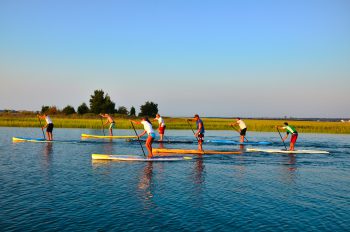WRIGHTSVILLE BEACH — On Friday, Dec. 2, construction crews will break ground on a stormwater reduction project at Blockade Runner Beach Resort in Wrightsville Beach that will redirect runoff from recreational waters to a new system that will infiltrate and reuse runoff for irrigation.

Photo: Blockade Runner Beach Resort
The North Carolina Coastal Federation is partnering with the resort for the construction of this new system.
Typical of many coastal towns, stormwater currently flows into existing drainage systems and discharges directly into the adjacent estuarine waters of Banks Channel. These recreational waters are heavily used each year by thousands of swimmers, paddle-boarders, sailors and kayakers.
The system is designed to capture runoff from the hotel building, parking lot and nearby streets into a temporary storage chamber where the runoff can be reused for landscaping, effectively reducing the hotel’s use of public drinking water for irrigation by an estimated 25 percent. The system design also allows for unused overflow to be stored in an underground infiltration system and to seep through the natural sandy soils rather than Banks Channel.
“The Blockade Runner is extremely excited about the upcoming project with the North Carolina Coastal Federation,” said Feletia Lee, environmental coordinator for the resort. “Our ownership has always promoted a community-centric business approach, and this infiltration project is a wonderful opportunity to embrace a public/private community partnership. This project will help to reduce the amount of polluted stormwater runoff that flows into Banks Channel, maintaining a healthy place to play and compete for our guests, athletes and locals. We are thrilled to be a part of this innovative project that supports our commitment to the environment and the community.”
The Blockade Runner project follows the construction of over 15 innovative stormwater reduction projects led by the federation in Wrightsville Beach. These stormwater runoff reduction projects are designed to implement the Bradley and Hewletts Creeks Watershed Restoration Plan, funded in part by the North Carolina Environmental Enhancement Grant Program.
“These individual projects will help to reduce the volume of polluted runoff that flows into our creeks and sounds” said Tracy Skrabal, a coastal scientist with the federation. “The higher goal is to use these very successful projects as demonstrations of what can be accomplished in a relatively easy and cost-effective way, and to see all of our coastal towns and highway planners incorporate these measures into their designs for new and existing development.”
In addition to the Blockade Runner project, the grant is providing funds to retrofit a 0.26-acre lot on Lynnwood Drive in the Glen Meade subdivision in Wilmington. The lot collects approximately 20 acres of the neighborhood in Hewletts Creek, contributing to the impairment of the watershed. The City of Wilmington Stormwater Services Heal Our Waterways program is working with the federation, the North Carolina Cooperative Extension and North Carolina State University to design a stormwater control measure to enhance the lot’s ability to capture, infiltrate and treat polluted runoff. Once constructed this December, this system will also help restore some of the natural hydrology of the watershed and reduce the volume of polluted runoff entering Hewletts Creek.
Press tours of the project at Blockade Runner Beach Resort will be given Dec. 5-9 upon request. Please contact Jessica Gray at jessicag@nccoast.org or 910-509-2838 ext. 204 to arrange for a tour.
